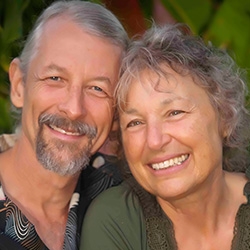
Search Results: men
-
To express opposition without stimulating distress, stop judging and look for ways to honor, understand, and have compassion for others. You can do this by finding a point of agreement. For example, you can agree with part of what they said. Or if you completely disagree, you can express what greater understanding, inspiration, appreciation or empathy you have in response to what they're saying. Read on for more on this, plus, ten sentence stems to get you started.
-
I love the insights, resources, and inspiration I get from this course. It gives you a glimpse into the support Miki offers around deepening the practice of nonviolence in thought, word, and action.
—Lore Baur, NVCA Course Coordinator, CNVC Certified Trainer.Miki is sharing what that means "Responding to the Call of our Time" for her and invites us to feel that call. This video illustrates how she is helping participants through teaching, coaching and mentoring so they can move forward with their challenges.
-
Trainer Tip: To defuse anger and create space for resolution, hear the other person’s feelings and needs. If this practice is new to you, you're like to experience fear and resistance in trying it out. However, you'll be more likely to experience a powerful shift, and build your capacity, if you try it anyways.
-
Inbal offers parents and anyone with children in their life a lucid discussion of the important role self-empathy plays in creating healthy, supportive relationships.
-
An exploration of four types of feedback: destructive criticism, constructive criticism, feedback by demonstration and dialogue.
-
Trainer Tip: If you are feeling anger, you are experiencing an unmet need. When you recognize it as a warning signal, it can be a life-serving tool.
-
Trainer tip: Demands are more likely to limit the possibilities and create distance between people. The trick to asking something as a request is valuing everyone’s needs equally. When you value everyone’s needs equally, then you are more willing to come to solutions that satisfy everyone. It thus opens possibilities and helps build connection.
-
- Cultivate thriving interpersonal relationships
- Discover paths to move beyond anger, blame, and judgment
- Connect with the Divine essence in other people
- Experience greater ease and joy in all your interactions
-
Welcome to June. It’s the beginning of summer in my area of the world and I usually find myself moving at a slower pace; spending more time outdoors and with friends, more time reading and gardening. I really enjoy the beginning of summer especially because the sun brings just enough heat to feel good, but not so hot to be uncomfortable.
-
Inbal offers parents and anyone with children in their life a lucid discussion of the important role self-empathy plays in creating healthy, supportive relationships.
-
CNVC trainer Yoram Mosenzon shares how expressing specific and authentic appreciation can deepen connection in intimate relationships. He emphasizes the importance of making clear observations without judgment and connecting with the feelings and needs that arise from meaningful gestures.
-
- Unpack interpersonal, internalized, and institutional racism from the lens of NVC consciousness
- Hear and share personal stories and the impacts of racism, power, and privilege
- Learn how to translate “hard to hear" messages into meaningful conversations
- Expand and deepen the conversation of systemic and interpersonal racism
-
Trainer Tip: Are you meeting your needs for exercise? Consider which activities would help you meet your needs for physical and emotional health and fun, rather than focusing on what expert opinion says. If you feel overwhelmed and had a hard time sticking to the program feel free to tweak your program so that you enjoy it more.
-
Mary Mackenzie shares how Marshall Rosenberg's Four D's of Disconnection live in her. Join Mary and learn how you can reframe the 4 D's to enhance connection.
-
-
-
Join CNVC Certified Trainers Jeff Brown, Jean Morrison, Karl Steyaert, Kathleen Macferran, Mary Mackenzie and Sylvia Haskvitz in a lively Q&A session focusing on naturalizing NVC into our daily interactions.
-
Trainer Tip: When have you responded in a way you didn’t want? How could you have handled that situation differently? What would have better met your needs? Try not to judge your behavior, but learn from it. Each time we review our actions, we can learn something, become more adept at new skills, and come closer to our ideal. We can do this with the learning curve of practicing translating people’s words into feelings and needs.
-
Trainer Tip: Ask someone what they enjoy about you being in their life. For example, “Would you tell me 3 specific reasons you enjoy having me in your life?” To a vague reply like, “Oh, you know I love you. I just like spending time with you.” Or, “You’re one of my best employees!” ask for more specificity (eg. “Can you tell me what I do and what needs it meets that makes me one of your best employees?”). This may reveal more to both of you.
-
Experience John Kinyon's application of NVC Founder Marshall Rosenberg's 4-part model of reconciliation and healing, a model he developed over the course of decades of work with people around the world who have experienced the deep pain of violence.



















